How to be a pescetarian – Embarking on a pescetarian diet offers a unique opportunity to embrace the benefits of plant-based eating while incorporating the nutritional advantages of fish and seafood. Understanding the principles, health implications, and practical aspects of this dietary approach will empower you to make informed choices and enjoy the culinary delights of a pescetarian lifestyle.
The pescetarian diet excludes meat and poultry but allows for the consumption of fish, seafood, and plant-based foods. This approach has gained popularity due to its potential health benefits, including reduced risk of cardiovascular disease, improved brain health, and support for sustainable fishing practices.
Introduction to Pescetarianism
Pescetarianism is a semi-vegetarian diet that includes fish and other seafood but excludes meat from land animals. It is a popular dietary choice for people who want to reduce their meat consumption while still getting the health benefits of omega-3 fatty acids and other nutrients found in fish.
There are many reasons why people choose to adopt a pescetarian diet. Some people do it for ethical reasons, as they believe that it is wrong to kill animals for food. Others do it for environmental reasons, as the production of meat has a significant impact on the environment.
Still others do it for health reasons, as a pescetarian diet has been linked with a number of health benefits, including a reduced risk of heart disease, stroke, and certain types of cancer.
Types of Pescetarian Diets
There are many different types of pescetarian diets, each with its own unique set of rules. Some pescetarians eat fish and other seafood, but no other animal products, while others may also eat eggs and dairy products. Some pescetarians only eat fish that is caught wild, while others may also eat farmed fish.
Ultimately, the type of pescetarian diet that you choose is a personal decision.
Health Benefits of a Pescetarian Diet: How To Be A Pescetarian
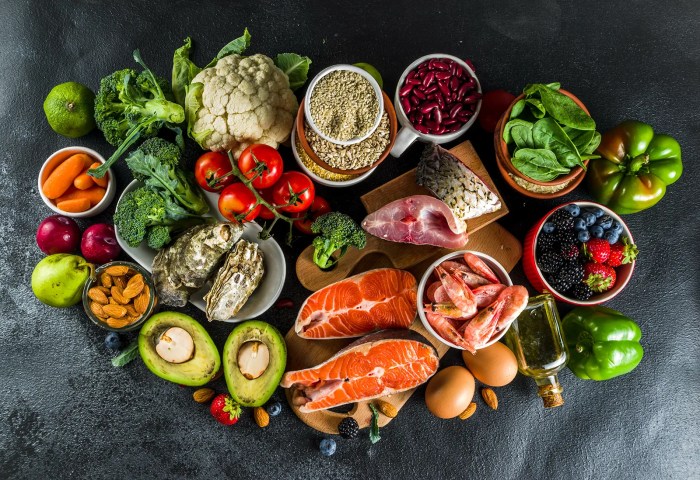
Adopting a pescetarian diet, which includes fish and seafood but excludes other types of meat, offers numerous health benefits. Fish and seafood are rich in essential nutrients that contribute to overall well-being and reduce the risk of various health conditions.
One of the key benefits of a pescetarian diet is the consumption of omega-3 fatty acids. These fatty acids play a crucial role in maintaining heart health and reducing the risk of cardiovascular disease. Omega-3 fatty acids have anti-inflammatory properties that help lower blood pressure, improve blood flow, and reduce the formation of blood clots.
Cardiovascular Health
- Studies have shown that individuals who consume fish and seafood regularly have a lower risk of developing heart disease, heart attacks, and strokes.
- Omega-3 fatty acids in fish help reduce triglyceride levels, a type of fat that can increase the risk of heart disease.
- Fish consumption has been linked to improved blood vessel function and reduced inflammation, which are important factors for maintaining a healthy heart.
Brain Health and Cognitive Function
In addition to cardiovascular health, a pescetarian diet has been associated with benefits for brain health and cognitive function.
- Fish and seafood are good sources of DHA, an omega-3 fatty acid that is essential for brain development and function.
- Studies have shown that individuals who consume fish regularly have better cognitive performance, including improved memory, attention, and problem-solving abilities.
- Omega-3 fatty acids have neuroprotective properties that may help reduce the risk of neurodegenerative diseases such as Alzheimer’s and Parkinson’s.
Challenges and Considerations of a Pescetarian Diet
Adopting a pescetarian diet requires careful planning and consideration to ensure adequate nutrient intake and address environmental concerns.
One potential challenge is meeting the body’s protein needs. While fish and seafood are good sources of protein, they may not provide sufficient amounts for individuals with high protein requirements. Incorporating plant-based protein sources, such as beans, lentils, tofu, and nuts, is essential to maintain a balanced diet.
Fiber Intake
Another consideration is ensuring adequate fiber intake. Plant-based foods are rich in fiber, which is important for digestive health and maintaining a healthy weight. Pescetarians should focus on consuming a variety of fruits, vegetables, and whole grains to meet their fiber needs.
Environmental Concerns
Seafood consumption raises environmental concerns related to overfishing and unsustainable fishing practices. Some fish species are at risk of depletion due to excessive harvesting, which can disrupt marine ecosystems and reduce biodiversity. By choosing sustainable seafood options, such as those certified by the Marine Stewardship Council (MSC), pescetarians can support responsible fishing practices and minimize their environmental impact.
Meal Planning and Recipes for Pescetarians
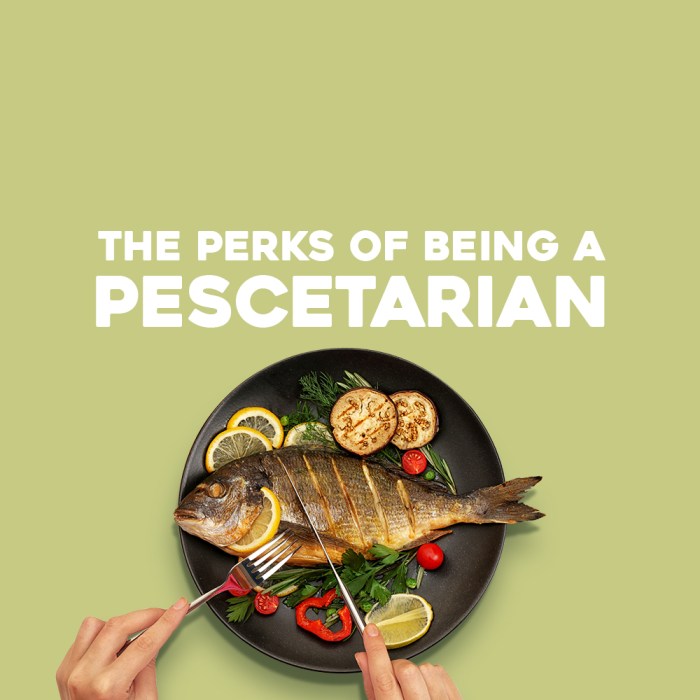
Adopting a pescetarian diet requires thoughtful meal planning to ensure adequate intake of essential nutrients while enjoying the culinary delights of seafood. Here’s a comprehensive guide to help you create balanced and nutritious pescetarian meals, along with a few sample recipes to whet your appetite.
For those looking to reduce their meat consumption without breaking the bank, consider exploring pescatarian recipes on a budget. This dietary approach focuses on seafood while limiting or eliminating meat intake, offering a cost-effective way to embrace a healthier and more sustainable lifestyle.
When planning your meals, focus on incorporating a variety of seafood, fruits, vegetables, and whole grains. Seafood is a rich source of omega-3 fatty acids, protein, and essential vitamins and minerals. Aim for at least two servings of fish or shellfish per week, choosing options like salmon, tuna, mackerel, or mussels.
Breakfast
Start your day with a pescetarian breakfast that provides sustained energy and essential nutrients. Consider options like:
- Smoked salmon with avocado toast on whole-wheat bread
- Greek yogurt with berries and a sprinkle of chia seeds
- Oatmeal with banana, walnuts, and a drizzle of honey
Lunch
For lunch, opt for meals that are both satisfying and nutrient-rich. Some pescetarian lunch ideas include:
- Grilled salmon salad with mixed greens, vegetables, and a light vinaigrette
- Tuna sandwich on whole-wheat bread with lettuce, tomato, and avocado
- Lentil soup with a side of crusty bread
Dinner
Dinner is the perfect time to experiment with different seafood dishes and flavors. Try these pescetarian dinner recipes:
- Pan-seared scallops with roasted asparagus and quinoa
- Baked salmon with lemon and herbs, served with roasted vegetables
- Shrimp stir-fry with brown rice and a side of steamed broccoli
Transitioning to a Pescetarian Diet
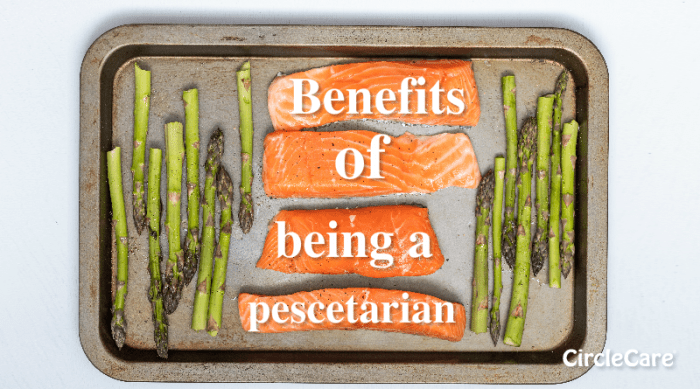
Embarking on a pescetarian diet doesn’t necessitate an abrupt shift. Adopting a gradual approach can enhance your chances of long-term success.
Begin by gradually reducing your meat consumption. Start by eliminating red meat, then processed meats like bacon and sausage. Gradually reduce the frequency of poultry and pork intake.
Seeking Professional Guidance, How to be a pescetarian
Consulting a registered dietitian or healthcare professional is highly recommended. They can assess your individual needs, provide personalized guidance, and ensure a balanced and nutritious transition to a pescetarian diet.
Looking for a healthy and budget-friendly way to enjoy seafood? Check out our pescatarian recipes on a budget that will satisfy your cravings without breaking the bank. From grilled salmon to hearty fish stews, there’s something for everyone to enjoy.
Conclusive Thoughts
Adopting a pescetarian diet requires careful planning and a commitment to incorporating a variety of plant-based foods to ensure adequate nutrient intake. By following the guidelines Artikeld in this comprehensive guide, you can reap the rewards of a pescetarian lifestyle, enjoying the health benefits, culinary diversity, and ethical considerations that come with this dietary choice.
Key Questions Answered
What are the main benefits of a pescetarian diet?
A pescetarian diet offers several potential benefits, including reduced risk of cardiovascular disease due to increased omega-3 fatty acid intake, improved brain health, and support for sustainable fishing practices.
How do I ensure I’m getting enough protein on a pescetarian diet?
To meet protein needs on a pescetarian diet, focus on consuming a variety of plant-based protein sources such as beans, lentils, tofu, tempeh, and nuts, in addition to fish and seafood.
Are there any risks associated with a pescetarian diet?
As with any dietary change, it’s important to consult with a healthcare professional or registered dietitian to address any potential risks or nutrient deficiencies associated with a pescetarian diet.


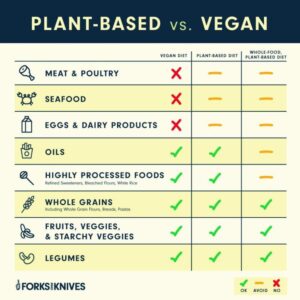
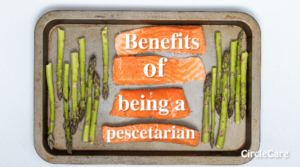
Leave a Comment